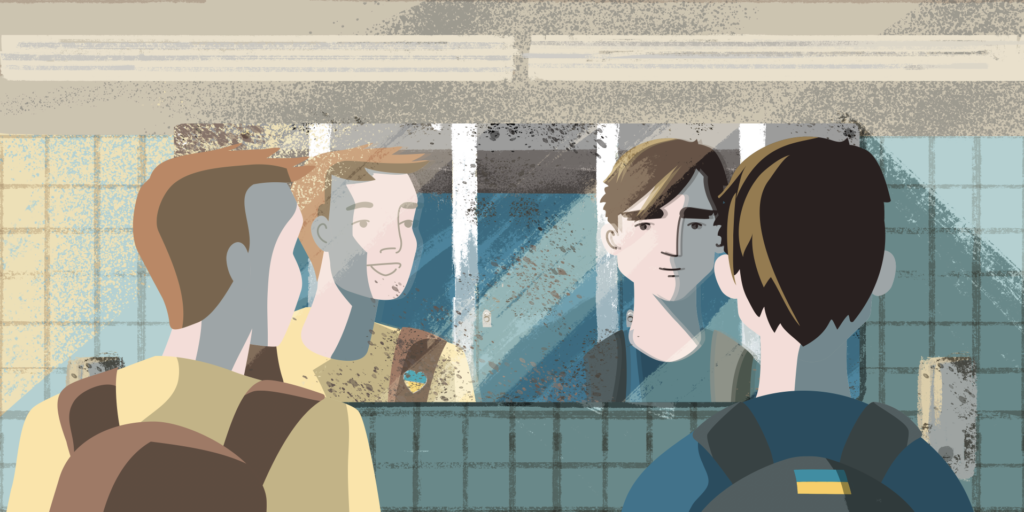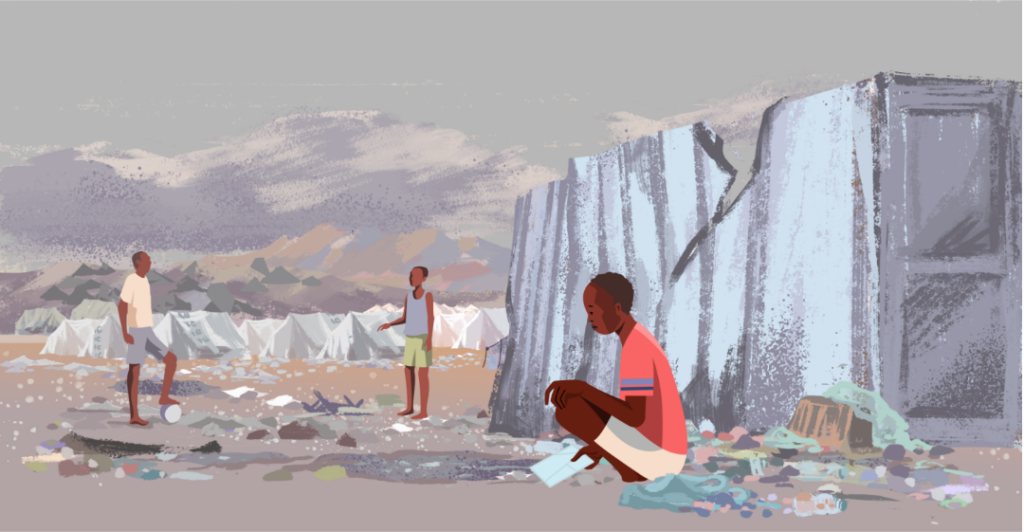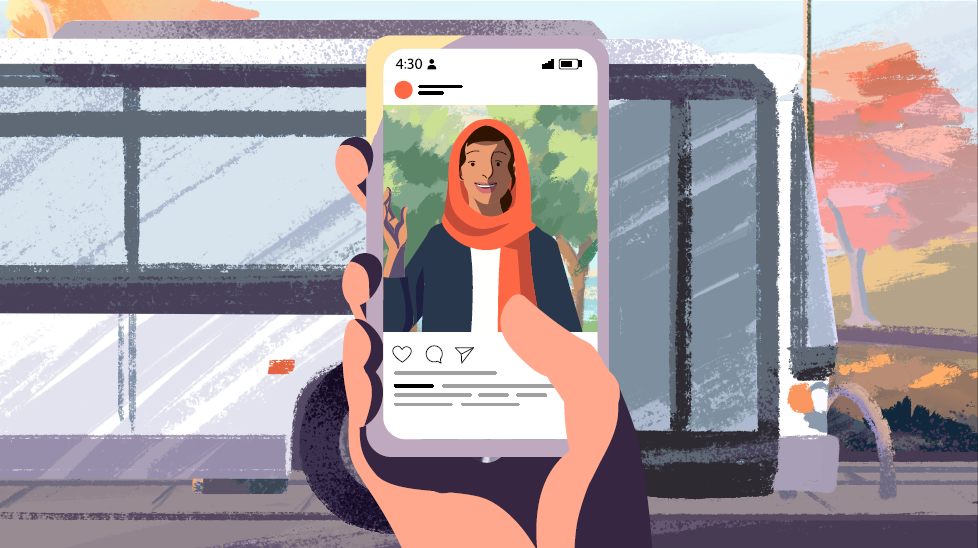Arabic
Resources for young people
Have you just watched our short film Childhood Trauma, War and Conflict? Maybe there were traumatic experiences of war and conflict where you grew up and you had to leave your home because it wasn’t safe. You may have had traumatic experiences on your journey to try to get to a safe place or even as you try to seek asylum. This information is to help you make sense of how you are feeling and how you can begin to recover.

Coping after experiences of war, conflict and migration
What does trauma mean?
Trauma is a word that is used to describe how really distressing experiences can affect us a long time after they have happened and make it harder to cope with everyday life.
No, not always. The frightening and distressing experiences of war and conflict can often leave people traumatised. But different people respond differently. Although everyone will think back on that time as upsetting and very difficult, some people will now know and feel that it is in the past and not continue to feel overwhelmed.
However other people might respond differently. They might find that even after the danger has passed, their body, mind and feelings make them feel as though the danger is happening again right now. And so they keep feeling really overwhelmed by their past.
Why don’t the feelings and memories of traumatic experiences always go away?
Distressing memories of traumatic events, along with the stress and painful feelings you felt at the time, can get stored in your brain in a way that keeps them coming back. So you keep feeling really stressed, scared, upset or angry. If this happens to you it doesn’t mean there is anything wrong with you or that you are ill or going crazy. It also doesn’t mean that these thoughts or feelings last forever. But these experiences can be really tough and make everyday life difficult.
How do I know if my reactions are normal or not?
There are lots of different ways you can react to trauma, in your body, your thoughts and your feelings. For example:
- My body hurts, I often get headaches or stomach aches even though I don’t have a physical illness.
- It’s difficult to sleep, I often have bad dreams.
- Distressing memories come into my mind during the day or night.
- I stay away from things, people and places that remind me of what happened.
- Even though I know I’m probably safe, I keep watching out for something bad to happen.
- Trusting people is difficult.
Having some of these difficulties is normal, in fact young people all over the world experience the same kind of reactions after traumatic events. But just because it’s normal, it doesn’t mean it’s easy or that it has to be like this forever.
Although sometimes these difficulties go away on their own, sometimes they don’t and they can make everyday life really hard. These longer term difficulties might be described as post traumatic stress-disorder (PTSD), anxiety or depression.
Why does my body not feel good?
During a traumatic experience your body will likely have some physical reactions- your heart might beat really fast, your breathing might be shallow, your legs might shake. Sometimes the body doesn’t go back to normal after the event is over and instead stays on ‘high alert’. This can make you feel unwell for months or even years after the actual danger is over. Your head might ache for example, your back or stomach might hurt and you can have all sorts of pains that aren’t because of a physical illness.

Managing in the moment
What can I do to feel better right now?
When you are in a dangerous or frightening environment it is important to do what you need to do to keep safe and cope. However, when danger has passed and life is actually now safe, there are coping strategies to help with big or overwhelming thoughts, feelings and memories in the moment. These aren’t about getting rid of your thoughts, feelings and memories or making them go away forever. But using a coping strategy might help you get through a difficult moment when you are feeling very upset, angry or frightened.
Different things work for different people. These are some that other young people who have experienced war and conflict have found useful. You might want to try some out to see if any help you. Young people have told us that it is important to use these coping strategies regularly and not just wait until they are feeling really bad.
You can download a self-help guide at the bottom of this page.

In the longer term
Memories from traumatic experiences like war and conflict can be really difficult to cope with. They can come into your mind at any time – even when you’re busy doing other things. They can even come into your sleep as nightmares. All sorts of everyday things might trigger a difficult memory.
Things you see, hear touch, smell or taste might remind you and make you feel like it’s happening all over again. Because of this, people often try really hard not to think about what happened and so they push the memories away. With trauma memories this strategy doesn’t really work in the long term.
When a traumatic event has just happened it can be helpful not to focus on your memories. But in the long term, pushing the memories away usually doesn’t really help and can sometimes make them worse.
Instead, when you are feeling a little braver you might begin to give the memories your time and attention. When you notice them coming into your mind, you might be able to remind yourself it is in the past and that you are safe now. You can also tell yourself that it will pass and imagine it passing through your mind like a train through a station or a storm cloud passing over your head. When the thoughts and memories keep going round in your mind it can be helpful to try things to express them and get them out of your head. You could do this by:
- Writing the memories down in a journal or notebook. You might be able to put the whole story down from beginning to end, but if this is hard then you could write small bits, one a time. At first you could even write it as though it happened to someone else. Is there someone you would like to show your writing to?
- Taking time to sit down and talk them through with someone you trust. Being able to say your story aloud and being listened to can be really helpful and you might start to find that you can cope with talking about it.
- Expressing the memories in a creative way, through painting, drawing, dance or music. Not only will you be getting the memories out of your but using colour, sound or rhythm might also show the feelings the memories have.
- It might feel easier to do these things with someone you trust, rather than being on your own with your difficult memories.
- You might also want to watch our animation ‘Coping with scary and distressing memories’.
What else can help me with everyday life?
It is not always easy or straightforward to rebuild your life even if you are now somewhere safe. Life might still feel uncertain and stressful and you might be really worried about your family and friends.
Coping with the impact of trauma can mean you spending more time alone, not wanting to do stuff that you once enjoyed. Doing some small things, however, can be little steps towards taking some control of today. You could try:
- Spending more time around others rather than on your own
- Doing more of the things you enjoy as this can make you feel good
- Finding ways to help others as this often helps you too.

Finding support
How can I recover from trauma from war and conflict in the longer term?
For most young people trauma reactions go away naturally over time. But sometimes they don’t. When things keep being hard and really get in the way of everyday life then it is helpful to think about getting some extra support. This doesn’t mean you are weak or crazy, it is common to need extra help when you’ve been through such awful things. Getting help can mean you will be more able to build a future for yourself and not be trapped by your past.
An adult such as a social worker, teacher or youth worker might have some ideas. You could also talk to a doctor and tell them about the trauma reactions you are still experiencing. You could even take a copy of the young people’s resource and show them which of the difficulties you are having. They might be able to arrange for you to speak to a trained therapist. It’s not always easy to ask for help, or to find the right help, but it can really make a difference.